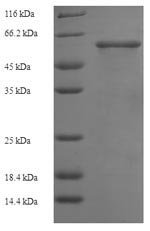Human Smad3 Recombinant Protein Product Attributes
Product Type: Recombinant Protein
Recombinant Smad3 based upon sequence from Human
Host: QP6697 protein expressed in E. coli.
Tag: His-SUMO
Protein Construction: A DNA sequence encoding the Homo sapiens (Human) Smad3, was expressed in the hosts and tags indicated. Please select your host/tag option, above.
Recommended Applications: Immunogen, Protein Standard, Cell culture, or Other Cell Biology Applications.
Application Notes: Please contact us for application specific information for QP6697.
Bioactivity Data: Untested
Full Length? Full Length
Expression Region: Met1 – Ser425
Amino Acid Sequence: MSSILPFTPP IVKRLLGWKK GEQNGQEEKW CEKAVKSLVK KLKKTGQLDE LEKAITTQNV NTKCITIPRS LDGRLQVSHR KGLPHVIYCR LWRWPDLHSH HELRAMELCE FAFNMKKDEV CVNPYHYQRV ETPVLPPVLV PRHTEIPAEF PPLDDYSHSI PENTNFPAGI EPQSNIPETP PPGYLSEDGE TSDHQMNHSM DAGSPNLSPN PMSPAHNNLD LQPVTYCEPA FWCSISYYEL NQRVGETFHA SQPSMTVDGF TDPSNSERFC LGLLSNVNRN AAVELTRRHI GRGVRLYYIG GEVFAECLSD SAIFVQSPNC NQRYGWHPAT VCKIPPGCNL KIFNNQEFAA LLAQSVNQGF EAVYQLTRMC TIRMSFVKGW GAEYRRQTVT STPCWIELHL NGPLQWLDKV LTQMGSPSIR CSSVS
Purity: Greater than 90% as determined by SDS-PAGE.
Reconstitution Instructions: Concentrated protein in liquid format. Reconstitution is not necessary.
Concentration of Human Smad3 Protein:
Endotoxin Levels: Not determined.
Buffer: Tris-based buffer, 50% glycerol
Storage Conditions: Store at -20C to -80C.
| Recombinant Human Smad3 Protein General Information | |
|---|---|
| Alternate Names | |
| Smad3, Smad 3, Madh3, mad3 | |
| Curated Database and Bioinformatic Data | |
| Gene Symbol | SMAD3 |
| Entrez Gene ID | 4088 |
| Ensemble Gene ID | ENSG00000166949 |
| RefSeq Protein Accession(s) | NP_001138574.1 |
| RefSeq mRNA Accession(s) | NM_001145102.1, NM_001145103.1, NM_001145104.1, NM_005902.3 |
| UniProt ID(s) | P84022 |
| UniGene ID(s) | Hs.727986 |
| HGNC ID(s) | HGNC:6769 |
| COSMIC ID Link(s) | SMAD3 |
| KEGG Gene ID(s) | hsa:4088 |
| PharmGKB ID(s) | PA30526 |
| General Description of Recombinant Human Smad3 Protein. | |
| Receptor-regulated SMAD (R-SMAD) that is an intracellular signal transducer and transcriptional modulator activated by TGF-beta (transforming growth factor) and activin type 1 receptor kinases. Binds the TRE elent in the promoter region of many genes that are regulated by TGF-beta and, on formation of the SMAD3/SMAD4 complex, activates transcription. Also can form a SMAD3/SMAD4/JUN/FOS complex at the AP-1/SMAD site to regulate TGF-beta-mediated transcription. Has an inhibitory effect on wound healing probably by modulating both growth and migration of primary keratinocytes and by altering the TGF-mediated chotaxis of monocytes. This effect on wound healing appears to be hormone-sensitive. Regulator of chondrogenesis and osteogenesis and inhibits early healing of bone fractures. Positively regulates PDPK1 kinase activity by stimulating its dissociation from the 14-3-3 protein YWHAQ which acts as a negative regulator | |
Limitations and Performance Guarantee
This is a life science research product (for Research Use Only). This product is guaranteed to work for a period of two years when stored at -70C or colder, and one year when aliquoted and stored at -20C.




There are no reviews yet.